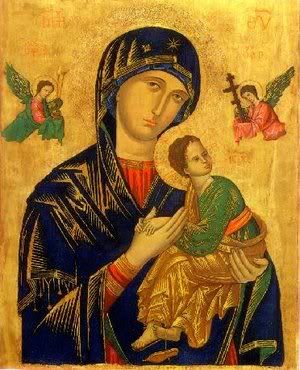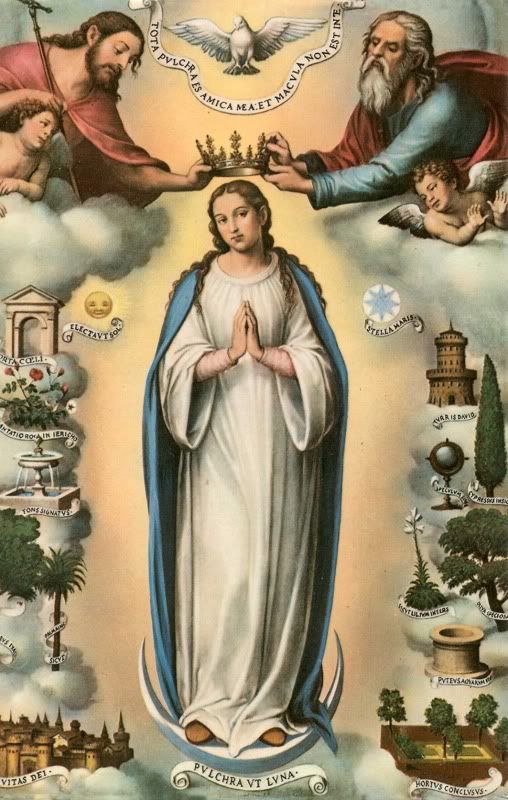Monday, February 8, 2010
Marian Mondays: Practical, Emotional, Rational
Last week, I began a new weekly post, which I have entitled Marian Mondays. In this weekly “column,” I plan to write about my growing devotion to Our Blessed Mother, contemplating the questions “Why pray to Mary?” and “Why pray the Holy Rosary?” along the way. Separating the Blessed Virgin Mary from the Catholic faith is no easy task, and as these weekly thoughts suggest, nor should it be. There are practical reasons, emotional reasons, and there are certainly rational Biblically-based reasons.
A few months ago, I was speaking with a colleague at work about this very topic. She was recounting that some of her Christian (but not Catholic) friends were giving her a hard time about Catholic devotion to Mary. Her response to these friends, as she recounted it, struck me as particularly practical. When asked, her friends readily acknowledged their practice of asking members of their families and churches to pray for them during difficult times or on an on-going basis. My colleague simply replied (and I’m paraphrasing), “If you ask your mother and your friends to pray for you, why wouldn’t you ask the Mother of God to pray for you as well?” I’m not sure what their answer was, but I think it raises a very practical point. In a world of prayer circles, lists, and phone trees, why wouldn’t we ask for the intercession of the Blessed Mother, the one who knows Jesus best?
Emotionally, many Catholics feel a deep spiritual connection to the Blessed Virgin Mary—some of friends even call her “the BVM,” not out of disrespect, but due to the devotion and intimate relationship they share with her. I, myself, can’t say that I grew up with a wondrous sense of Our Holy Mother’s place in my life. But that all changed in the months leading up to my pilgrimage to Lourdes, and has certainly continued to grow since that time. I will be writing more about my personal experience in Lourdes, beginning on the feast day and anniversary of Our Lady of Lourdes’ first apparition, later this month on the eleventh. Suffice to say for the purposes of this post, it was for me an emotional and deep experience unrivaled by any other in my life. The call of the Blessed Mother was unmistakable.
Lastly (for today anyway!), we look to Scriptures, and that which has been recorded regarding the role of Mary throughout the New Testament. This will be something that I will focus on in future posts—for those of you eager to get to the “meat” of the issue, I encourage you to come back. I have all year, after all! Our Lady’s intercession has characterized Christian prayer since the Church began—from the Annunciation, to the Visitation; From the Nativity to Pentecost; From the Presentation at the Temple to the Passion and Death of our Lord; From the Miracle at the Wedding in Cana to the everyday moments depicted in the Gospels. The disciples of Jesus treated Mary, the Mother of God, with respect, and offered to her deep love beyond the ordinary. For Mary, the solitary meaning of her life became her Son, our Lord—a simple fact that many might attribute to all mothers, and indeed, in that way, she became a model of Christian motherhood. But Our Mother’s devotion to Jesus is far larger, all-encompassing, and impossible to understand. Having offered herself to the Lord, Mary is inextricablly tied to Christ, understanding him, giving her physical and emotioanl life to him, loving him, suffering with him.
Monsignor Romano Guardini, in his contemplations on the Holy Rosary, The Rosary of Our Lady (1955, originally published in German), offers this thought on the relationship between Mary and Jesus: “There are two possibilites of greatness. One is to be great oneself: a creator, a hero, a herald, a man of special destiny. The other is to love such a great person; and this possibility seems of equal value. In order to comprehend the life of someone else, one’s own heart should measure up to the image of the beloved. What do we mean, then, when we say that Jesus Christ was the substance of Mary’s life?”
We see then, as Monsignor Guardini puts it, that Christ was the “substance” of Our Blessed Mother’s life—the focus of attention and emotion, the meaning, the purpose—the inexplicable and unseverable connection which resulted from the Incarnation. What a joy for Mary, and what a sacrifice! What a joy for us to have such an advocate! Hail Holy Queen!


No comments:
Post a Comment
Thanks for leaving a comment. If you wish to submit a prayer request, however, please do so above, using the "Contact" tab.